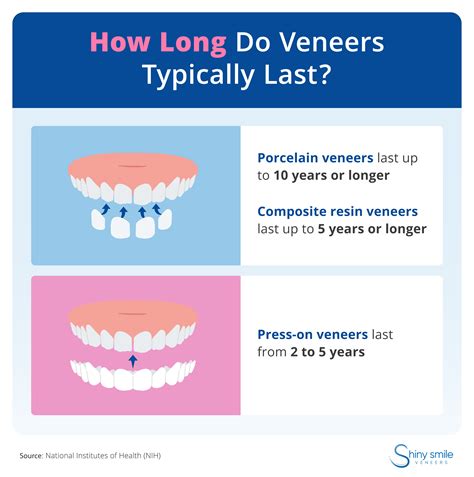Veneer: Last Up To 20 Years

The world of dental veneers has evolved significantly over the years, offering individuals a chance to transform their smiles with minimal invasion. Dental veneers, thin layers of material placed over the teeth, have become a preferred choice for those seeking to correct various dental imperfections, from discoloration and chips to misalignment. One of the most compelling aspects of veneers is their durability, with the potential to last up to 20 years, depending on the material used and the patient’s oral hygiene practices.
Understanding Dental Veneers
Dental veneers are custom-made shells designed to cover the front of the teeth, improving their appearance. They are typically made from porcelain or composite resin materials, each offering its unique set of benefits. Porcelain veneers are renowned for their natural appearance and durability, while composite veneers are valued for their affordability and the ability to be repaired if damaged.
Material Selection: A Key to Longevity
The choice of material for veneers significantly influences their lifespan.
- Porcelain Veneers: These are the most durable type, known for their resistance to stains and their ability to reflect light similarly to natural teeth, making them nearly indistinguishable from the real thing. With proper care, porcelain veneers can last up to 20 years or more.
- Composite Veneers: Although not as durable as porcelain, composite veneers are still a viable option, especially for those looking for a more budget-friendly solution. They can last for about 5 to 10 years before needing replacement.
Factors Influencing the Longevity of Veneers
While veneers can last up to 20 years, several factors can influence their durability and overall performance:
- Oral Hygiene Practices: Regular brushing, flossing, and dental check-ups are crucial. Poor oral hygiene can lead to complications such as gum disease, which can jeopardize the veneers.
- Diet: Consumers of hard foods, ice, or foods high in sugar and acid may reduce the lifespan of their veneers. These substances can cause wear and tear, or even chipping of the veneer.
- Grinding and Clenching: Habits such as teeth grinding (bruxism) can put excessive pressure on veneers, potentially leading to their early failure.
- Quality of the Veneer: The skill of the dentist and the quality of the veneer material play significant roles in determining how long the veneers will last.
Maintenance and Aftercare
To ensure veneers reach their full potential lifespan, maintenance is key:
- Regular Dental Visits: Regular check-ups help in early detection of any issues that could affect the veneers.
- Avoiding Bad Habits: Quitting habits like nail biting, ice chewing, or using teeth as tools can significantly extend the life of veneers.
- Mouthguard: For those who grind their teeth, wearing a mouthguard at night can protect the veneers from unnecessary wear.
Conclusion
Dental veneers offer a transformative solution for individuals seeking to enhance their smile. With the potential to last up to 20 years, they represent a long-term investment in one’s dental aesthetics and overall confidence. By choosing the right material, maintaining good oral hygiene, and adopting a veneer-friendly lifestyle, individuals can enjoy their veneers for decades to come.
How long do dental veneers typically last?
+Dental veneers can last up to 20 years, depending on the material and the patient’s oral health practices. Porcelain veneers are known to be more durable than composite veneers.
What factors can influence the longevity of dental veneers?
+Factors such as oral hygiene practices, diet, grinding and clenching habits, and the quality of the veneer itself can influence how long veneers last.
How can I maintain my dental veneers to ensure they last as long as possible?
+Maintaining good oral hygiene, avoiding harmful habits like grinding or biting hard objects, and attending regular dental check-ups can help extend the life of your veneers.
